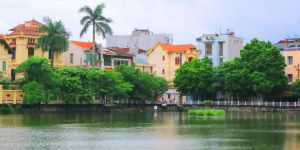Fact or Fiction?
Subscribe to the topic
Post new topic
Recently, many Vietnamese have told me I shouldn't eat vegetables at food stalls because they are unhealthy. My friends are claiming that they are using a chemical spray which incredulously makes the vegetable mature into fantastic sizes overnight. Is there any validity to these claims? I keep trying to tell my friends that they shouldn't believe everything they see on television, and I have a difficult time believing that they have the technology to do this. If they could make vegetables grow overnight, wouldn't this be a valuable tool to help feed starving communities in sub-Saharan Africa? It's just not plausible.
Secondly, these same friends are telling me to stay away from certain foods (like chicken feet), because they're brought in from China. They continually say how terrible the products from China are, but I can't really see that Chinese products are much different from Vietnamese products. The processing methods and technology has got to be really similar. Is all of this just government propaganda against China?
If you have any insight on these things (or proof), could you please include links. Thanks so much for helping me clear this up, I'm really curious.
I always listen to the old ladies in the supermarket when I go shopping myself whilst in HCM - the younger people know what to avoid, the older people know why to avoid them.
Truth in labeling doesn't exist in VN, fruits are imported from overseas - usually China - and, magically, between the wholesale markets and the retail stores the labels change. Many printers have a range of labels so 888 Apples from China become Washington - a state well-known for it's fruits.
Durians, my favourite, and jackfruit, etc., are injected with chemicals to make them look 'fresh' way beyond their Best Before date. This is done by injecting a dubious chemical, readily available in certain markets, with a fairly large diameter needle through the 'stalk'. Usually there three small holes to show where the needles went in.
I have seen doctored fruit even at better supermarkets including Giants.
'Morning Glory' and other green-leafed vegetables thrive on the banks of polluted rivers, other vegetables are actually grown on pallets floating in the river.
Various alternative fertilisers are used by farmers, including human 'night' soil, or other animal manures. These are the reasons why it is unwise to eat raw (uncooked) vegetables unless you know or can trust your source. Perhaps that's why pho is so hot, so you can immerse the veggies and kill off the bugs!
Luckily, for those living in the south, the 'bad' Chinese food is more rare that in places such as Ha Noi or Hai Phong which are close to the Chinese border with lower transportation costs.
Vietnamese like chicken feet, again the source is determined by the cost of transportation, and given then pitiful amount if meat from a single foot, it takes several feet to make a diner happy, and then only after being cooked for hours.
The OP said: "They continually say how terrible the products from China[ are, but I can't really see that Chinese products are much different from Vietnamese products.". The products from China imported in to VietNam are not the best. You will see Mothers carefully reading the labels of products in the supermarkets - Vietnamese shoppers must be amongst the best label readers around.
Whether it's melamine in milk, Red Dye No. 4 – a more current dye) (E124), Yellow dye #6 (E110) and Yellow Tartrazine (E102) (these are the Euro identifiers), Sodium Nitrate/Sodium Nitrite, Sulfur Dioxide (E220). Bad things from China also include lead paint on children toys, cadmium in jewelry, antifreeze in toothpaste and, naturally, contaminated pet food.
Vietnamese pork products (Nhu Lan brand is recommended) taste differently as much fewer chemicals are used in production, as with Vietnamese chickens (massive thighs, skinny breasts). There is a chicken producer using chickens from Australian bred stock that grows chickens for KFC and the Western consumers here.
None of this would help 'feed starving communities in sub-Saharan Africa' - it's not commercial.
And this not just government propaganda against China?
But is American food that much better? Pink slime and offal in hamburgers, hundreds of thousands of tons of tainted meat meat recalled - from so many meat sources they can't identify the cause. And who knows what goes in the processed food - given the industry self-inspects so much?
In Britain supermarkets were found to be selling Wild Boar, Deer, Horse and Donkey meat as minced beef! Tesco supermarkets even mislabeled fish - boosting the profit margins.
And don't even talk about organic or vegetarian food!
As the restaurant manager said to a customer, who found what appeared to be a pubic hair in their food, "Just pay for the food" .
Thanks for clarifying that for me. All of that sounds quite plausible. I was being told that the vegetables were being sprayed which would make them mature from seedlings into large adult fruit overnight. That's what made me think of feeding hungry communities.
Is China intentionally trying to poison the Vietnamese people, or are those practices acceptable for Chinese also?
I was never trying to compare western food systems with Vietnam,some of these claims just sounded unbelievable.
tsshapiro wrote:Is China intentionally trying to poison the Vietnamese people, or are those practices acceptable for Chinese also?
No, China is an equal opportunity food poisoner - they kill their own much more frequently than VNese - besides we have the Ho Cho Minh City Health Department standing on guard for us.
tsshapiro wrote:Recently, many Vietnamese have told me I shouldn't eat vegetables at food stalls because they are unhealthy. My friends are claiming that they are using a chemical spray which incredulously makes the vegetable mature into fantastic sizes overnight. Is there any validity to these claims?
Yes, its true. Lots of validities are available in Vietnamese articles (not sure if avail in English). You can watch this video reported by Vietnamnet http://vietnamnettv.vn/doi-song/vach-ma … -c101.html
tsshapiro wrote:I have a difficult time believing that they have the technology to do this. If they could make vegetables grow overnight, wouldn't this be a valuable tool to help feed starving communities in sub-Saharan Africa? It's just not plausible.
The technology itself is not the problem. The problem here is to overuse the technology
tsshapiro wrote:Secondly, these same friends are telling me to stay away from certain foods (like chicken feet), because they're brought in from China. They continually say how terrible the products from China are..
Yes, they are. Check this link out to see the proof on the 40-year freezing chicken foot detected by Chinese police themselves http://www.thanhnien.com.vn/pages/20130 … -quoc.aspx
tsshapiro wrote:I can't really see that Chinese products are much different from Vietnamese products. The processing methods and technology has got to be really similar.
Yes, the processing methods are similar, except for the Chinese overuse the harmful chemicals
tsshapiro wrote:Is all of this just government propaganda against China?
No, not at all. This is all about the human health care issue.
tsshapiro wrote:If you have any insight on these things (or proof), could you please include links. Thanks so much for helping me clear this up, I'm really curious.
Again, tons of articles on various prestigious online newspapers about this issue (some even included tests/examinations by scientists) are available in Vietnamese (not sure but I believe some are avail in ENglish - otherwise you can use Google Translation)
I think most of the chemicals used are for making the fruits ripen early and to delay the rotting process not for making them larger.
My brother in law grows durion and refuses to add any special chemicals other than normal pesticides. Again most of the chems for durions are to make them mature faster so they are all ready to leave the tree around the same time.
VungTauDon wrote:I think most of the chemicals used are for making the fruits ripen early and to delay the rotting process not for making them larger.
This is correct - extending shelf life after arrival at store/market.
They prefer to use aging rather than rotting - it sounds better!
So... what about eating at restaurants? What are the risks of eating this kind of food? I've eaten almost everything I got my hands on since I arrived here over a year ago. I haven't noticed any illness or sickness. Is it really bad if I eat some cucumbers that come with my lòng nướng?
tsshapiro wrote:So... what about eating at restaurants? What are the risks of eating this kind of food? I've eaten almost everything I got my hands on since I arrived here over a year ago. I haven't noticed any illness or sickness. Is it really bad if I eat some cucumbers that come with my lòng nướng?
Quite high - that's why the HCM Health Department closes restaurants down - and posts a Cong An outside - and some are quite fancy restaurants, too!
I guess if you have been in the military you are immune to most things anyway.
tsshapiro wrote:Recently, many Vietnamese have told me I shouldn't eat vegetables at food stalls because they are unhealthy. My friends are claiming that they are using a chemical spray which incredulously makes the vegetable mature into fantastic sizes overnight. Is there any validity to these claims? I keep trying to tell my friends that they shouldn't believe everything they see on television, and I have a difficult time believing that they have the technology to do this. If they could make vegetables grow overnight, wouldn't this be a valuable tool to help feed starving communities in sub-Saharan Africa? It's just not plausible.
Secondly, these same friends are telling me to stay away from certain foods (like chicken feet), because they're brought in from China. They continually say how terrible the products from China are, but I can't really see that Chinese products are much different from Vietnamese products. The processing methods and technology has got to be really similar. Is all of this just government propaganda against China?
If you have any insight on these things (or proof), could you please include links. Thanks so much for helping me clear this up, I'm really curious.
Tsshapiro,
Your friends are absolutely 100% correct although exactly what it is they are using and what they are using it on will probably always remain a mystery. I personally know 2 companies where I live (in Binh Duong) bordering Cu Chi district that spray these chemicals to grow rau muon. I have seen with my own eyes the planting, the spraying, and subsequently, the harvesting from start to finish in a mere 24-36 hours. Again, that's from start to finish. It's not believable until you see it yourself. I know I didn't.
Can't imagine what they're spraying is good for you.
Another horrific thing to be concerned about is eating completely rotten pig and beef products. Trucks and drivers are constantly being fined for transporting rotten food to restaurants. If it makes it there these restaurants boil the maggot crusted, feces smelling products with chemicals and in a milk solution so the smell completely goes away, cooks it according to the menu, then happily serves it to unknowing patrons. We're not talking about something's that's just past the expiration date; were talking stuff that's so rancid that it would probably kill you if you took a good whiff. You can google it.
JVo18 wrote:Trucks and drivers are constantly being fined for transporting rotten food to restaurants. If it makes it there these restaurants boil the maggot crusted, feces smelling products with chemicals and in a milk solution so the smell completely goes away, then happily serves it to unknowing patrons. We're not talking about something's that's just past the expiration date; were talking stuff that's so rancid that it would probably kill you if you took a good whiff.
Large supermarkets discard food products at dates given on packaging. I know yoghurt is 'tossed out' but then it is resold in local markets. Market vendors don't realise yoghurt is NOT a long-life product.
If you have smelly chicken, soaking it overnight in vinegar and water removes the smell. Tip from a chef who works at a hotel near LE LOI and DONG KNOI!
Thank you all very much for the information. Now, that I know about the dangers, what can I do to mitigate the risks? Is the only option to stay at home and cook my own food? I'm currently living in a hotel and I have been since I arrived in Vietnam. I don't have an option to cook. Must I just accept these risks while I am here, or is there something I can do to help ensure some safety.
From the moment I arrived I knew that food safety wasn't a serious priority here. Just watching food stalls and restaurants I can see they're not concerned with temperature control or food cleanliness. I suppose I could just keep doing what I have been doing. I don't seem to notice any ill effects yet. Which leads me to my next question, what kind of ill effects should I expect? Will I get seriously ill with food poisoning (like the norovirus), or is this something that is going to kill me in the long run?
Thanks again for all your insight.
Articles to help you in your expat project in Vietnam
 Dating In Vietnam
Dating In VietnamIf you're considering moving to Hanoi, or Ho Chi Minh City, the dating scene may be of interest to you. ...
 Making phone calls in Vietnam
Making phone calls in VietnamThe telecommunications sector in Vietnam has flourished throughout the past two decades. Like many foreigners, ...
 Moving to Vietnam with your pet
Moving to Vietnam with your petIf you are planning to move to Vietnam with a pet, there are a number of formalities that have to be completed ...
 Driving in Vietnam
Driving in VietnamVietnam is known for four categories of lush and diverse landscapes, and one of the easiest ways to see firsthand ...
 Getting married in Vietnam
Getting married in VietnamHave you met that perfect someone who you want to spend the rest of your life with? Luckily, getting married in ...
 Sports activities in Hanoi
Sports activities in HanoiWe know there's a lot of attention on the drinking culture in Hanoi, but what about the options for a healthy ...
 The most popular neighbourhoods in Hanoi
The most popular neighbourhoods in HanoiFormerly known as Thang Long, Vietnam's present capital city was renamed Hanoi in 1831. This enchanting, ...
 Working in Vietnam
Working in VietnamAnyone thinking about working in Vietnam is in for a treat. Compared to many Western countries, Vietnam's ...
Find more topics on the Vietnam forum



